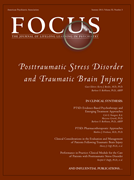Ethics Commentary: Treatment of PTSD Empirically Based and Ethical Clinical Decision Making
Ethical Principles
Autonomy
Beneficence
| Organization | Recommendations |
|---|---|
| American Psychiatric Association | 2004 Guideline (9) |
| “SSRIs are recommended as first-line medication treatment for PTSD…Other antidepressants, including tricyclic antidepressants and…MAOIs… may also be beneficial in the treatment of PTSD.” (p. 13) | |
| “Benzodiazepines may be useful in reducing anxiety and improving sleep…[a]lthough their efficacy in treating the core symptoms of PTSD has not been established...” (p. 13) | |
| “In addition to being indicated in patients with comorbid psychotic disorders, second-generation antipsychotic medications…may be helpful in individual patients with PTSD. Anticonvulsant medications…, α2-adrenergic agonists, and Î (2)-adrenergic blockers may also be helpful in treating specific symptom clusters in individual patients.” (p. 13) | |
| 2009 Update (10) | |
| “…[T]he SSRIs may no longer be recommended with the same level of confidence for veterans with combat-related PTSD as for patients with non-combat-related PTSD.” (p. 3) | |
| “As described in the 2004 guideline, no significant differences among antidepressants, including the SSRIs, were found in the few head-to-head studies…Since that time, studies… have generally demonstrated the superiority of antidepressants to placebo but have done little to clarify the relative utility of these different antidepressants.” (p. 4) | |
| “…[D]ata are encouraging for adjunctive treatment with a second-generation antipsychotic in patients who have partially responded to an SSRI or an SNRI, including for co-occurring psychotic symptoms.” (p. 5) | |
| “Randomized controlled trials of anticonvulsant medications remain extremely limited in number and have shown mixed results…[Thus] limited evidence of efficacy precludes any recommendations for change in practice.” (p. 5) | |
| International Society of Traumatic Stress Studies | “The best evidence supports the use of SSRIs and SNRIs as first-line drugs for PTSD. There is also good evidence that augmentation with atypical antipsychotic agents is effective. Recent results with prazosin and mirtazapine are also promising. MAOIs are moderately effective and TCAs are mildly effective agents, although both may produce adverse side effects.” (Foa et al. [14] p. 567) |
| National Institute for Health and Care Excellence | “Drug treatments for PTSD should not be used as a routine first-line treatment for adults (in general use or by specialist mental health professionals) in preference to a trauma-focused psychological therapy.” (National Institute for Clinical Excellence [15], p. 5) |
| “Drug treatments (paroxetine or mirtazapine for general use, and amitriptyline or phenelzine for initiation only by mental health specialists) should be considered for the treatment of PTSD in adults who express a preference not to engage in trauma-focused psychological treatment.” (National Institute for Clinical Excellence [15], p. 5) | |
| Institute of Medicine | “Based on its assessment of the medications for which randomized controlled trials were available…the committee found the evidence for all classes of drugs reviewed inadequate to determine efficacy for patients with PTSD. Important comments are appended to the conclusions for alpha-adrenergic blockers, novel antipsychotics, benzodiazepines, and SSRIs.” (Institute of Medicine (16), p. 85) |
| Organization | Recommendations |
|---|---|
| American Psychological Association Division 12 (13) | Strong research support for prolonged exposure, cognitive processing therapy, EMDR, present-centered therapy, seeking safety (for PTSD with comorbid substance use disorder). |
| Modest research support for stress inoculation training. | |
| International Society of Traumatic Stress Studies | CBT that comprises exposure therapy (imaginal and in vivo exposure), CT, SIT or one of the many combination programs that incorporate some form exposure with CT (e.g. CPT) or SIT is recommended as a first line treatment for chronic PTSD.” (Foa et al. [14], p. 556) |
| “EMDR is widely applicable to civilian PTSD cases and also has some efficacy with combat-related PTSD.” (Foa et al. [14], p. 574) | |
| National Institute for Health and Care Excellence | “All people with PTSD should be offered a course of trauma-focused psychological treatment (trauma-focused cognitive behavioural therapy [CBT] or eye movement desensitisation and reprocessing [EMDR]). These treatments should normally be provided on an individual outpatient basis.” (National Institute for Clinical Excellence [15], p. 4) |
| Institute of Medicine | “Based on its assessment of the psychotherapy approaches for which randomized controlled trials were available…the committee found the evidence for all but one psychotherapeutic approach inadequate to reach a conclusion regarding efficacy. The evidence was sufficient to conclude the efficacy of exposure therapies in treating patients with PTSD.” (Institute of Medicine [16], p. 85) |
| Note: CPT (27) was included as an exposure therapy. Resick and colleagues (28) have since published a dismantling study that indicates removing the exposure components from the protocol did not decrease the efficacy of the treatment, suggesting this treatment is perhaps better thought of as primarily a variant of cognitive therapy than a form of exposure therapy. |
Nonmalfeasance
Discussion
Option 1
Option 2
Option 3
Option 4
Closing Comments
References
Information & Authors
Information
Published In
History
Authors
Funding Information
Metrics & Citations
Metrics
Citations
Export Citations
If you have the appropriate software installed, you can download article citation data to the citation manager of your choice. Simply select your manager software from the list below and click Download.
For more information or tips please see 'Downloading to a citation manager' in the Help menu.
View Options
View options
PDF/EPUB
View PDF/EPUBGet Access
Login options
Already a subscriber? Access your subscription through your login credentials or your institution for full access to this article.
Personal login Institutional Login Open Athens loginNot a subscriber?
PsychiatryOnline subscription options offer access to the DSM-5-TR® library, books, journals, CME, and patient resources. This all-in-one virtual library provides psychiatrists and mental health professionals with key resources for diagnosis, treatment, research, and professional development.
Need more help? PsychiatryOnline Customer Service may be reached by emailing [email protected] or by calling 800-368-5777 (in the U.S.) or 703-907-7322 (outside the U.S.).

